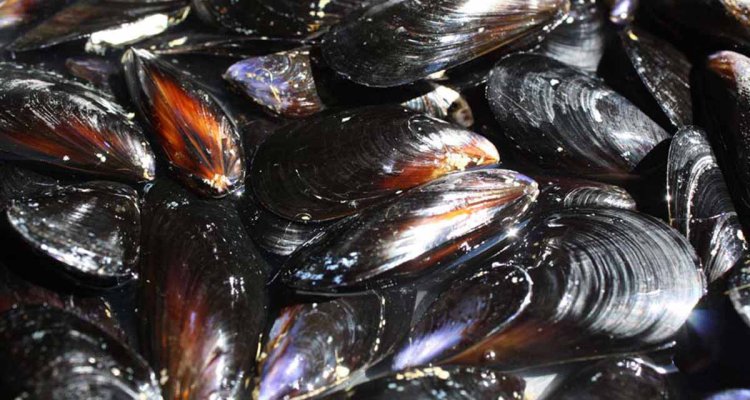
Internship
Student research project: Perceptions and social acceptability of shellfish aquaculture
We are looking for a masters’ student in the social sciences who would like to contribute to improving our understanding about what drives social acceptability of shellfish aquaculture. The research project can be adapted to meet the requirements of a research internship or a full masters’ thesis.
Background to our research question
Shellfish aquaculture is the cultivation of bivalve molluscs such as mussels and oysters in marine waters. Cultivation can take place on the seabed or by using nearshore or offshore artificial structures, such as suspended rope culture. Shellfish aquaculture has been taken place for many centuries, but in more recent times has gained significant attention due to its potential to provide sustainable seafood with a low carbon footprint, support local economies, and offer various ecosystem services. Such ecosystem services include water filtration, habitat creation, and nutrient cycling. Shellfish are renowned for their ability to filter large volumes of water, improving water quality by removing excess nutrients and suspended particles. Additionally, shellfish form vital habitats for a diverse array of marine life, enhancing biodiversity and supporting fisheries. Despite these benefits, public perceptions of shellfish aquaculture can vary widely. While many recognize its environmental and socio-economic advantages, concerns regarding habitat alteration, water quality (localised eutrophication) and the use of coastal space are often raised. Additionally, concerns about the safety and quality of shellfish products, may lead to hesitancy among consumers. Whilst internationally, shellfish aquaculture production is increasingly being promoted as one of the most sustainable sources of animal protein, opposition towards this form of aquaculture seems to be growing.
In The Netherlands, the main form of shellfish aquaculture is mussel farming. This mainly takes place in the Wadden Sea. Mussel seed is harvested either from wild mussel beds or mussel seed collectors, and then re-laid on cultivation parcels on the seabed. These activities are strongly regulated, as the Wadden Sea is a nature conservation area. This includes a covenant between the mussel sector, the government and environmental organisations which outlines steps to reduce the mussel seed fishery. In addition, there is a government ambition laid down in the recently published ‘Food vision for the North Sea’ to increase aquaculture production, including shellfish.
The ambition to increase production is shared by the mussel sector. As mussel production in the Wadden Sea cannot further grow due to regulations and lack of societal support, increasing production is only an option in nearshore or offshore areas in the North Sea. This is development is associated with regulatory, technical, economic and social challenges, which are well-understood from previous research. What is less well-understood are public/societal perceptions and social acceptability of shellfish aquaculture (inshore and offshore). Gaining insights in such perceptions and social acceptability and how and why these may have changed over time is important in the context where, on the one hand, increasing shellfish production as a form of sustainable and healthy source of animal protein is both a policy and sectoral goal.
Assignment
In this research project, you will carry out a review of the international peer-reviewed literature on (public) perceptions on shellfish aquaculture (benefits, challenges). You will systematically investigate what factors and contexts drive these perceptions and how social acceptability of shellfish is improved or eroded. You will also explore international online media sources, and interview international experts in the field. You will evaluate the relevance of your findings for the Dutch context, leading to recommendations on how to address potentially address social acceptance issues in relation to contribution of shellfish aquaculture as a sustainable, low-impact form of animal protein production.
The work is part of the KOMPRO project (knowledge and research for mussel production).
Whom are we looking for?
- We are looking for a masters’ student in the social sciences;
- You have demonstrable training and experience in applying social science research; methodologies in your previous degree (Bachelor’s) or work;
- You can work independently;
- You enjoy doing research;
- You have good writing skills and enjoy writing.
Practical information
- The research project can be adapted to meet the requirements of either a research internship or a full Master’s thesis.
- The KOMPRO project is carried out by Wageningen Marine Research (WMR) - Yerseke. In case of a research internship you are expected to work in Yerseke most of the week. In case of a full thesis, you may carry out your research from your home university, but you are expected to meet your WMR supervisor in person once a week (Yerseke or IJmuiden). You are also expected to give at least 2 progress presentations to the KOMPRO research team, and a final (in-person) presentation to the team and the Mussel Producers’ Organisation.
- Period: Four to six months, depending on your university requirements.
- Start: 1 July 2024 at the earliest.
- You will receive a monthly internship renumeration.
Application
Send a short motivation and your CV to Nathalie Steins: nathalie.steins@wur.nl.